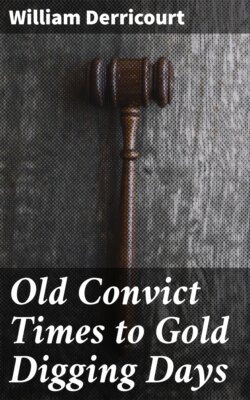Читать книгу Old Convict Times to Gold Digging Days - William Derricourt - Страница 6
На сайте Литреса книга снята с продажи.
CHAPTER II.—A RUNAWAY APPRENTICE.
ОглавлениеTable of Contents
So far my apprenticeship had gone on to my master's satisfaction. But one day my mistress gave me the remains of a pot of beef broth to give to the dogs. I set this down, without seeing that there was in it a piece of hard shin-bone. One of my master's best dogs seized this bit of bone, and was quietly gnawing it in a corner when its owner unfortunately came in, and fearing his pet's teeth would be destroyed, turned his fury upon me, and so beat me that I at once bolted, and, for the time, cut his acquaintance and lock-filing. Having made my escape I wandered along The Leisures until I was lucky enough to obtain employment at half-a-crown a week on the fly-boat running to Worcester. My business was to take the shift either day or night in driving the towing horses. After some time I learned to steer the boat, and gave up the whip to another hand. In passing the locks it was my place to assist in opening and shutting the lock gates, and, as I was deficient in strength for this purpose, my employer bestowed on me heavier curses, and still heavier blows. So fearfully was I beaten that I determined to take French leave of this fresh-water sailing. Learning from a lad on the boat that, in a tunnel through which we had to pass for a distance of two miles, there was a sort of landing place, I made up my mind to jump off the boat I was steering, unseen by the man who was "legging" her through the tunnel.
This I succeeded in doing, and at once made off, guiding myself through the slime and ooze by groping with my hands against the damp and dripping wall. After what seemed to me hours of crawling along I came to a flight of steps, up which I proceeded for some time. I at last saw a light ahead, but on reaching it found the stairway blocked by a heavy iron grating, which was locked. I shouted and screeched the remainder of the afternoon, till, completely worn out by cold, hunger, and fatigue, I fell into a deep sleep, and never stirred till morning. Feeling then somewhat refreshed by my long rest I began shouting again, endeavoring to draw the attention of some chance passer-by or inmate of the place, which I afterward found to be one of the underground entrances to Dudley Castle. At length a woman belonging to the Castle passed by my prison bars on her way to find her cows, and, hearing my clamor, brought the blacksmith, who, after calling a constable, cut the lock from the grating, and so far released me. But this was merely out of the frying-pan into the fire; for on being questioned, and having no trustworthy account to give of myself, I was marched off to the lock-up, and, upon inquiry being made, I was discovered to be a runaway apprentice from Darliston, and forthwith handed over to my former employer of bulldog-keeping fame. After being taken to him at Darliston I was removed to Bilston, tried for my desertion, and sentenced to one month in Stafford Gaol, with a flogging at the beginning and end of the term. After my last flogging and discharge, I was so overcome with the fear of further punishment that I hastened back to the place of my apprenticeship, passing through Pancridge and Wolverhampton.
I arrived in Bilston at the height of the fearful outbreak of cholera.* So severe was the disease in Bilston that nearly every third house had the window-shutters closed, showing that there had been a death there; while in all directions "dead carts" were hurrying with their ghastly contents to common pits and trenches. While passing down a street in Bilston I met an old man with a roll of street ballads in his hand, who was bellowing out lustily the following rhyme suitable for the occasion:—
The best advice as I can give
Is moderation; let us live,
And we shall have no cause to grive
For Mr. Cholera Morbus.
In the midst of the chorus, "For Mr. Cholera Morbus," he dropped down dead at my feet, while I seized on a batch of his ballads and made off. Returning shortly afterward, I saw him picked up and borne off by the dead cart.
[* Cholera, it will be remembered, first appeared in Great Britain in 1831, and raged till 1832. It was not, however, so fatal as it was on the Continent. In Paris 18,000 persons died between March and August, 1832.]
